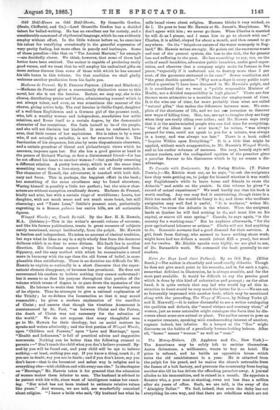Winged Words ; or, Truth Re-told. By the Rev. H.
R. Haweis, M.A. (Isbister.)—This is the writer's seventh volume of sermons, and like his former publications, treats in great measure of subjects rarely mentioned, except incidentally, from the pulpit. Mr. Haweis is fearless and independent. He takes no account of clerical tradition, but says what he likes to say in a style wholly free from the decorous dullness which is so dear to some divines. His fault lies in another direction. His liveliness cannot always be distinguished from ,flippancy, and the easy method with which he reconstructs a creed more in harmony with the age than the old forms of belief, is more plausible than satisfactory. There is no doctrine too difficult for Mr. Haweis to explain so rationally in a short discourse that the super- natural element disappears, or becomes less prominent. He does not recommend his readers to believe nothing they cannot understand ; but it seems to us that his purpose throughout that portion of the 'volume which treats of dogma is to pare down the mysteries of the faith. He labours to make that faith more easy by removing some of its objects. Thus he attempts to give a rational explanation of the Trinity; he re-defines the Incarnation so that it may sound -reasonable; he gives a modern explanation of the sacrifice of Christ ; and asserts that though the vicarious Atonement is countenanced by St. Paul, "as between Christ and the Father, the death of Christ was not necessary for the salvation of the world." We do not suppose that many thoughtful men go to Mr. Haweis for their theology, but on social matters he speaks and writes admirably ; and the first portion of Winged Words, upon "Children and Parents," upon " Love and Marriage," upon "Health and Influences," is full of practical advice and suggestive comments. Nothing can be better than the following counsel to parents :—" Don't teach the child what you don't believe yourself. By- and-by you will be found out, and your child will be apt to believe nothing,—at least, nothing you say. H you know a thing, teach it ; if you nre in doubt, say you are in doubt ; and if you don't know, say you don't know—that is the honestest and safest way in religion and in -everything else—with children and with every one else." In the chapter on "Marriage," Mr. Haweis takes it for granted that the education 111 women makes them inferior to men. The husband is advised to be patient with his •wife, since want of intelligence makes her exact- ing. "Her mind has not been trained to estimate relative values like yours." And women, we are told, are wonderfully conceited about religion. "I knew a bride who said, 'My husband has what be calls broad views about religion. Mamma thinks it very wicked, so do I. He goes to hear Mr. Haweis at St. James's, Marylebone. We don't agree with him ; we never go there. When Charles is married he will do as I please, and I mean him to go to church with me." Charles, it is added, obeyed for about a month, and then ceased to go anywhere. On the "iniquitous nature of the water monopoly in Eng- land," Mr. Haweis writes strongly. He points out the enormous waste and cost of the present system, the loss to the rich, the far greater loss and suffering to the poor. He has something to say, too, on the evils of small laundries, advocates public laundries, under good super- vision, and observes that a company might make its fortune in five years, "especially if it undertook not to destroy more than 5 per cent. of the garments entrusted to its care." Sewer ventilation and "the great dustbin question" (Why now-a-days is every public topic called a question ?) have been discussed in Mr. Haweis's pulpit, and it is considered that we want a "public responsible Minister of Health, not a divided responsibility in high places." There are few themes more attractive to a moralist than the employment of time. It is the wise use of time, far more probably than what are called "natural gifts," that makes the difference between men. We com- plain of the shortness of life, and we tax oar invention to discover new ways of killing time. Men, too, are apt to imagine they are busy when they are really idling over trifles ; and Mr. Haweis says truly that it is the active-minded people who can find time for everything. " One of the idlest men I ever knew," he writes, " was always pressed for time, could not speak to you for a minute, was always in a hurry, and was always too late." There is a book called "Inquire Within upon Everything." It is a title that might be applied, without much exaggeration, to Mr. Haweis's Winged Words, and to his earlier volumes of sermons. His racy, homely style will attract readers, and the undisguised egotism of the preacher gives a peculiar flavour to his discourses which is by no means a dis- advantage.


































 Previous page
Previous page